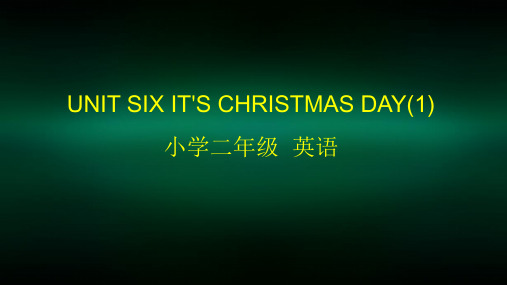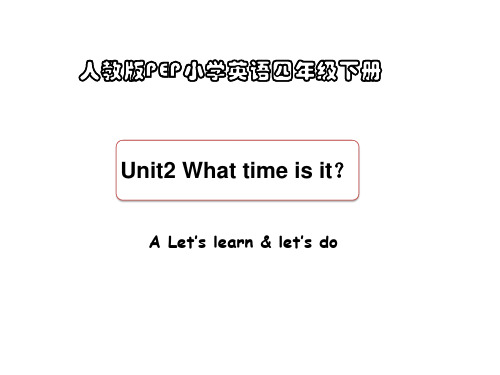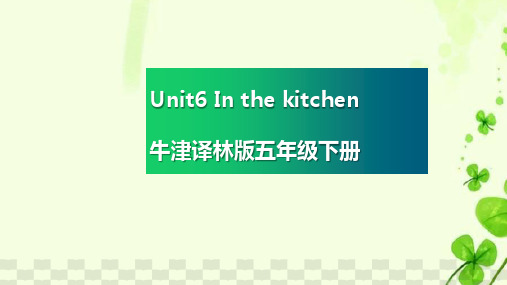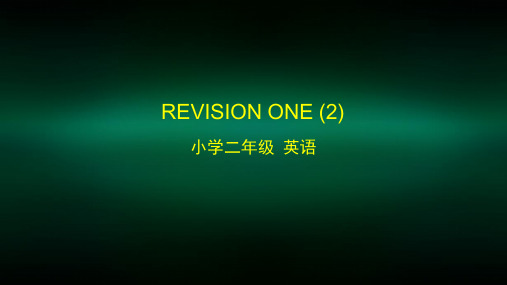小学英语食物2.ppt
二年级【英语(北京版)】UNIT SIX IT‘S CHRISTMAS DAY(1)-2PPT

Oh, I'm sorry.
How old are you?
I'm eight. Today is my birthday.
Thank you, sir!
Wow! Happy birthday to you!
I'm nine.
I'm ten.
I'm eight, too.
How olld are you, lolovveelylycchhildildrerenn??
Let's put candles on the cake.
I'm four.
How old are you, Peppa?
Make a wish, Peppa. Thank you.
Happy birthday!
house mouse
loud
how
cow
now
ou ow
ou ow
mo u t h
52
Thank you. I'm so happy today.
I'm eight. Have some cake, please.
Happy birthday to you, Lingling!
Thank you. I'm so happy today.
52
How old are you?
I'm eight. Have some cake, please.
Thank you. I'm so happy today.
How old are you?
I'm eight.
Have some cake, please. Thank you.
人教版四年级英语下册第二单元PPT课件

2. 间接表达法 A. 如果分钟数少于30分钟,可用分钟 + past + 钟点表示,其中past是介词,意思是 “过”。如:
twenty past four 四点二十 eight past one 一点八分 B. 如果分钟数多于30分钟,可用(60分钟原分钟数)+ to +(原钟点数+ 1)表示, 其中to是介词,意思是“差”。 如: 8:35 可表示为twenty-five to nine 差二十 五分钟九点
人教版PEP小学英语四年级下册 Unit2 What time is it?
A Let’s learn & let’s do
minute hand 分针
What time is it? It’s 3 o’clock.
Is it time for dinner?
No, it isn’t. It’s time for music class.
clock有时钟的意思,o’clock是of the clock的缩写,用于表示钟 点数,一般情况下o’clock只用于表示整点。没有复数形式。
Let’s read together!
Do you know?
“到做某事的时间了”—It’s time for… 课文应用:It’s time for dinner.到吃晚餐的时间了。 句型结构:It’s time for+名词 it代表的是时间,不可用其他词代替。for后面直接接 名词,不需要用冠词修饰。
What time is it?
It’s 6 o’clock. It’s time for…dinner
场景1:John 与吴一凡的对话
OK.
场景2:John 与吴一凡在做什么?
小学英语六年级下册专题复习——名词(课件)

“ ’s ” “’”
“ ’s ” “’”
You can draw a mindmap in your way.
YOUR LOGO
I WIAH I LIVED HERE
Homework 1.完善思维导图。 2.完成同步课课练。
YOUR LOGO
I WIAH I LIVED HERE
Goodbye!
man__________
Let's check
desks buses familyies days knikvnesife
gigrilrsl wawtachtcehs partiyes keys leavfes
YOUR LOGO
I WIAH I LIVED HERE
Let's check
potatoes photos Chinese mmeann chchilidldren
小学英语六年级下册专题复习
名词
六年级 下册
仕版奋扬学校:何浇桐 霞石善祥学校:李淑铭,黎乐仪
名词专题
Watch and answer
1.Who went shopping?
YOUR LOGO
I WIAH I LIVED HERE
2.What did they buy in the supermarket?
the boy’s legs
the pens of Mr Jones
Mr Jones' pens
the keys of the men
the men’s
keys
the songs of the teachers
the teachers' songs
Hooray!
上海市小学二年级英语牛津2AM3U2c(课堂PPT)

1
Paula has an orange. It’s on a plate. It’s for her pig. Her pig is fat and big With four short legs. Oink! Oink! Oink! Come and eat the orange. It’s on the plate.
9
He takes out his toy box. He puts everything out of the box. But he can’t find it.
10
Ben: Where is my pencil? I can’t do my homework. Mum: Really? Look, what is it?
6
Where’s my pencil? I can’t find it. It’s not in my pencil case.
7
It’s not …
Ben takes everything out of his bag.
8
It’s not …
He looks under his bed. But he can’t find his pencil.
4
Look at your room. ______ on the floor /in the bed /under the desk…What a mess!
I am sorry!
This is Ben’s room. “What a mess”,
Mum always says.
5
One day Ben sits down to do his homework. But he can’t find his pencil.
牛津译林版小学英语五年级下册uni6 in the kitchen复习课件

10. angry adj.生气的,愤怒的
(1) 短语: be angry with sb. 生某人的气 例句: The teacher is very angry with Tom.
(2) feel angry 感到生气 get angry with sb. 生某人的气 be angry at 为…… 生气
A. play B. playing C. plays
7. love 喜爱,喜欢,爱
(3)[谚语] Love me,love my dogs. 爱屋及乌
练一练. 南希喜爱唱歌和跳舞。 Nancy loves singing and dancing.
( B )Do you love______ the piano? A. play B. playing C. plays
--How many spots are there on this ladybird? --There are__seven/7____ spots.
12. catch v. 抓住
(1) 第三人称单数:catches 现在分词:catching (2) catch up 追上
例句: ① We are catching butterflies. ② Hurry up, we need to catch up the early bus.
练一练 ( C ) Are you ready _____school?
A. to B. with C. for
7. love 喜爱,喜欢,爱 (1)现在分词:loving 第三人称单数:loves 过去式:loved 近义词:like
(2) 解析:love 的用法与like 相同 后面可以接名词,代词或者动词ing 形式。
二年级【英语(北京版)】REVISION ONE(2)-2PPT课件无视频和音乐

Wait! … feet!
today key jeep bike bee wait play wave leaf feet like Friday sea I
Aa
Ee
Ii
P10
P20
P30
Look, read and write (看一看,说一说,写一写)
g te w t pl
Frid
sk
vening
NEXT
It’ s Friday today, two bees play in the sea.
I like this leaf!
I like this wave!
I see a key. I see a jeep.
I see my bike. I see...
Wait! … feet!
a key
peach key
queen
Let’s read
A peach for each and one for the queen. You see a key on his knee.
A peach for each and one for the queen.
You see a key on his knee.
I like my white ice cream. white ice cream
Let’s read
ice cream, white ice cream, my white ice cream, I like my white ice cream.
ice cream white ice cream my white ice cream I like my white ice cream.
REVISION ONE (2)
人教PEP版小学五年级下册英语精品教学课件 Unit 2 第2课时Part A Let's try

点击选项开始做题。
NEXT
选词填空。 1. ____( Which/What) season do you like best? 2. I like ____(夏天) best. (autumn/summer) 3. _____ you like the music?( Do /Does)
连词成句。
Group work Which season do you like best?Ask and answer.
Ask and answer
0
5
25
10 20 15
best? Summer.
开始
Let’s write and tick.
S1
√
Language points
询问某人最喜欢的季节
课文原句:—Which season do you like best, Mike? —Winter. I like snow.
句型结构:—Which season do you like best? —I like+季节+best. / 季节.
Language points 如:—Which season do you like best, Jack? —I like summer best./Summer.
seasons. Which season do you like best, Mike? Mike: Winter. I like snow . Mr Jones: I like snow, too. Which season
do you like best, Wu Binbin? Wu Binbin: Spring. It’s pretty. Mr Jones: Yes, it is.
外研版小学四年级英语上册M6U2课件

4. -__A__ -Yes, of course.
A. Can I come in? B. Sorry, you can’t. C. Can I have some soup? D. Thank you .
三、译一译。 1. Can I have some fruit?
_我__能__吃__些__水__果__吗_?____
Listen to the songs and fill in blanks. It’s the_M__id_-_A_u_t_um__n_F_e_s_ti_v_al___! Hooray, hooray, hooray! Let’s _s_in_g_s_o_n_g_s_about the moon! Let’s eat_m__oo_n__ca_k_e_s__ and let’s play!
Listen and chant with it.
Can I have some soup? Can I have some fruit? Yes, you can.
Yes, you can. And you can have some rice. They’re all very nice.
Let’s chant together.
Extension.
中秋节文化知多少
中秋节,又称祭月节、月光诞、月夕、秋节、仲秋节、拜月节、 月娘节、月亮节、团圆节等,是中国民间的传统节日。中秋节源 自天象崇拜,由上古时代秋夕祭月演变而来。中秋节自古便有祭 月、赏月、吃月饼、看花灯、赏桂花、饮桂花酒等民俗,流传至 今,经久不息。中秋节起源于上古时代,普及于汉代,定型于唐 朝初年,盛行于宋朝以后。中秋节是秋季时令习俗的综合,其所 包含的节俗因素,大都有古老的渊源。中秋节以月之圆兆人之团 圆,为寄托思念故乡,思念亲人之情,祈盼丰收、幸福,成为丰 富多彩、弥足珍贵的文化遗产。
外研版小学英语(一年级起点)二年级上册Module 1 Unit 2课件

外语教学与研究出版社 二年级 | 上册
Lead in
Let’s sing!
ABCD, EFG, HIJK, LMNOP, QRS, TUV, WX, Y and Z.
Vocabulary
外语教学与研究出版社 二年级 | 上册
football
外语教学与研究出版社 二年级 | 上册
basketball
外语教学与研究出版社(一起) 二年级 | 上册
Module 1 Unit 1
I like football.
Warm up
外语教学与研究出版社 二年级 | 上册
Let’s chant One finger one finger, turn turn turn, turn to a knife, cut cut cut Two fingers two fingers, turn turn turn, turn to a rabbit, jump jump jump Three fingers three fingers, turn turn turn, turn to a fork, dig dig dig Four fingers four fingers, turn turn turn, turn to a cat, miao miao miao Five fingers five fingers, turn turn turn, turn to a tiger, growl growl growl
Wrap up
外语教学与研究出版社 二年级 | 上册
What do you like?
What do you like?
外语教学与研究出版社 二年级 | 上册
What colour do you like?
科普版六年级英语上册《Lesson 2 第3课时》课堂教学课件PPT小学公开课

Lesson 2 Read 的前两个场景和Make and say科普版 英语 六年级上册I’m going to buy a mapof China tomorrow.ReviewI’m going to buy some beautiful crayons tomorrow.['nevə(r)] 从未;决不He never does it.[ˈsætədeɪ]星期六Every Saturday, John goes to Mr Smith’s house.What are you going to do next Sunday? I’m going to do some shopping.What are you going to do tomorrow?We're going to play football with my friend.Lead inMr Going-to-doRead请听录音!后熟读!2.mp4Mr Going-to-doReadJohn lives in a village.约翰住在一个村庄里。
But people often call him “Mr Going-to-do”.但是人们经常叫他“打算去做先生”。
Do you want to know why?你想知道为什么吗?John always says, “I’m going to do ...”约翰总是说,“我打算去做......”But he never does it.但是他从来不做。
Mr Going-to-doEvery Saturday, John goes to MrSmith’s house and talks with him.每个周六,约翰去史密斯先生家和他谈话。
“I’m going to clean my house tomorrow,”he says, or “I’m going to wash my carnext week.”“明天我打算去打扫我的房子”,他说,或者“下一周我打算去洗汽车。
